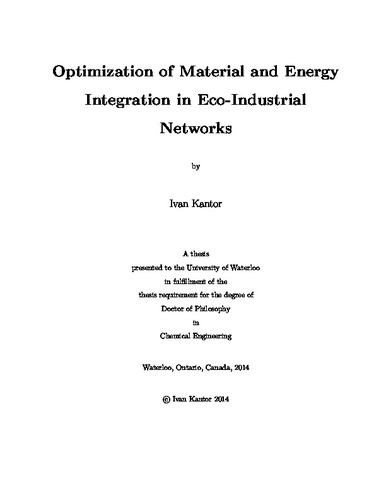| dc.description.abstract | This work develops a generalized modeling framework using several techniques for assessing the feasibility of an eco-industrial network or ‘eco-park’ in order to demonstrate the environmental and economic benefits of industrial facilities with cooperative goals to conserve energy and materials. The work takes advantage of three distinct types of modeling techniques (linear programming, mixed-integer linear programming and mixed-integer non-linear programming) to incorporate increasingly complex circumstances for designing eco-industrial networks. The purpose of this research is to provide policy-makers and facility designers with an approach to optimize construction of facilities based upon economic and environmental incentives. This framework allows for optimizing the material and energy efficiency of a network of facilities to reduce emissions, waste, and input of materials and energy while maintaining production levels.
Major contributions from this thesis are to examine the potential for alternative-fuel vehicles within the concept of a hydrogen economy and exploration of eco-industrial networks, utilizing the tools of life cycle analysis and system optimization. Life-cycle assessment is utilized as a tool for decision-making throughout this thesis and is an invaluable asset in making environmentally-conscious decisions. This type of assessment evaluates the emissions of a product from virgin material extraction through to final disposition in the aquatic, terrestrial or atmospheric domain. The use of life-cycle assessment techniques shows clear impacts on society over the entire lifecycle of the products and processes considered herein. Development of a dual-objective function to account for economics and environmental performance of industrial facilities is developed and utilized to aid in the decision process for policy-makers and facility designers.
The concept of eco-industrial networks is further extended by including additional components, such as transportation modes, within the model. To this end, preliminary work examines the practical possibility of shifting automobile propulsion technologies to alternative fuels with emphasis on the criteria air contaminants considered herein of greenhouse gases, volatile organic compounds, and oxides of sulphur and nitrogen. The scenarios presented are based on a model of the electricity system in the province of Ontario, Canada and energy pathway analysis to assess the supportable market penetration of, and emissions from, alternative vehicle technologies. The recommendation of this work is that a transition to electric vehicles in the near-term followed by a transition to hydrogen fuel cell vehicles will yield the largest reduction in criteria air contaminants in both the urban centre of Toronto, Ontario and in the province as a whole.
The consideration of transportation and transitional technologies feeds directly into the concept of eco-industrial parks and the benefit to society of their implementation. The reduction in transportation distance between relatable chemical manufacturers has been hailed as a major benefit of implementing eco-industrial park topology. This work develops a generalized modeling framework for eco-industrial parks based on a dual objective of societal and industrial requirements. The nodes considered in this work include: energy generation via hydrocarbon gasification or reforming, carbon capture, carbon sequestration, pressure-swing adsorption in addition to the manufacture of ammonia and urea within the context of refueling a fleet of 1000 hydrogen vehicles. Life-cycle assessment is applied to form the societal benefits of operating facilities within an eco-industrial framework and the long-term economics of the processes are considered to form the economic portion of the objective. Modeling is carried out in three distinct types: linear programming, mixed-integer linear programming and mixed-integer non-linear programming. Each of these types represents a different modeling framework developed to assess various complexities in the eco-industrial network and yet they share common goals, themes and analysis methods. Using each of these approaches, a case study eco-industrial park is analyzed using the three types of modeling methodologies mentioned. The simpler LP model is unable to account for some of the complexities inherent in an eco-park network and thus the results from this model are subsequently viewed as an upper boundary on the benefits of eco-industrial integration for the case study mentioned. The subsequent efforts of mixed-integer linear and non-linear programming serve to refine the model and provide more realistic investigation of the benefits of such a network.
In order to achieve a reduction in emissions of harmful substances to the air, water and land to meet national targets, analysis of the interactions between humans and the environment must be explored to unlock new avenues of production and consumption to reduce the impact that society is having on the environment. This work is completed within the larger context of the potential hydrogen economy with the supposition that such a scenario will be enabled by increasingly effective technology. The transition of our current infrastructure to the hydrogen economy shows benefits to air quality from reduced emissions of vehicles and also from a reduced industrial contribution. | en |

